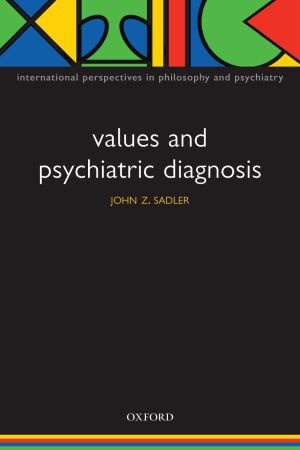Read more
Zusatztext John Sadler mounts a persuasive argument that values, usually seen as subjective (and therefore fallable), are impossible to separate from those concepts, even "facts", we consider objective . . . The bulk of his discussion concerns the Diagnostic and Statistical Manual of Mental Disorders and the ontological assumptions - as Sadler puts it, "assumptions about the way things are" - that underlie its efforts. He offers us what he calls "an alternative path", to better enable diagnosticians in understanding their own cultural assumptions and biases. This is no abstract exercise, especially now, when, as Sadler notes, "the term 'values' is often used to shore up all sorts of political agendas, social reform intentions, and voter turnout". It's a bracing approach, challenging to all struggling to reconcile the needs of clinical practice with the unsettling fear that categorisations of any sort merely serve the collective interest. Klappentext The public! mental health consumers! as well as mental health practitioners wonder about what kinds of values mental health professionals hold! and what kinds of values influence psychiatric diagnosis. Are mental disorders socio-political! practical! or scientific concepts? Is psychiatric diagnosis value-neutral? What role does the fundamental philosophical question "How should I live?" play in mental health care? In his carefully nuanced and exhaustively referenced monograph! psychiatrist and philosopher of psychiatry John Z. Sadler describes the manifold kinds of values and value judgements involved in psychiatric diagnosis and classification systems like the DSM. Professor Sadler takes the reader on a fascinating conceptual tour of the inner workings of psychiatric diagnosis! considering the role of science! culture! sexuality! politics! gender! technology! human nature! patienthood! and professions in building his vision of a more humane psychiatric diagnostic process. Zusammenfassung The public, mental health consumers, as well as mental health practitioners wonder about what kinds of values mental health professionals hold, and what kinds of values influence psychiatric diagnosis. This book is a most readable and scholarly examination of the role played by value judgements in mental illness, psychiatric diagnosis, and the DSM. Inhaltsverzeichnis Part 1: Introduction 1.1: Background 1.2: Why psychiatric diagnosis and classification? 1.3: A brief personal history of nosological controversy 1.4: Defining 'values' 1.5: Overview of the book Part 2: Methods 2.1: Background 2.2: Kuhn on scientific theory change 2.3: Values, value terms and value semantics 2.4: Five heuristic types of values 2.5: Unravelling the dense fabric of values Part 3: Science 3.1: Background - relations between medicine and science 3.2: Basics of classification 3.3: Science and psychiatric nosology Part 4: Patients, professions and guild 4.1: Background 4.2: Patients 4.3: Professions 4.4: Guild interests and classification 4.5: Potential professional conflicts of interest in the DSMs 4.6: Weighing patient, professional and guild interests in the DSMs Part 5: Space, time and being 5.1: Background 5.2: Defining mental disorder 5.3: World views, assumptions and ontological values 5.4: The constraint of ontological space - the transpersonal psychiatry critique 5.5: The constraint of ontological time - the developmentalist critique 5.6: Space and time recast - existential-phenomenological and social constructionist critiques 5.7: Three contrast cases for ontological values in psychiatry Part 6: Sex and gender 6.1: Background: the declassification of homosexuality 6.2: "Mad" vs "bad" in the bedroom 6.3: Mental disorder diagnosis and women: what are the issues? 6.4: Discrimination and stigma as negative value- consequences ...

